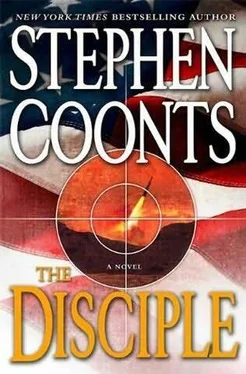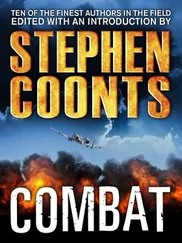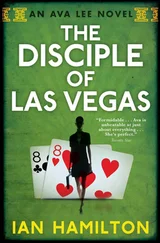Stephen Coonts - The Disciple
Здесь есть возможность читать онлайн «Stephen Coonts - The Disciple» весь текст электронной книги совершенно бесплатно (целиком полную версию без сокращений). В некоторых случаях можно слушать аудио, скачать через торрент в формате fb2 и присутствует краткое содержание. Жанр: Триллер, на английском языке. Описание произведения, (предисловие) а так же отзывы посетителей доступны на портале библиотеки ЛибКат.
- Название:The Disciple
- Автор:
- Жанр:
- Год:неизвестен
- ISBN:нет данных
- Рейтинг книги:4 / 5. Голосов: 1
-
Избранное:Добавить в избранное
- Отзывы:
-
Ваша оценка:
- 80
- 1
- 2
- 3
- 4
- 5
The Disciple: краткое содержание, описание и аннотация
Предлагаем к чтению аннотацию, описание, краткое содержание или предисловие (зависит от того, что написал сам автор книги «The Disciple»). Если вы не нашли необходимую информацию о книге — напишите в комментариях, мы постараемся отыскать её.
The Disciple — читать онлайн бесплатно полную книгу (весь текст) целиком
Ниже представлен текст книги, разбитый по страницам. Система сохранения места последней прочитанной страницы, позволяет с удобством читать онлайн бесплатно книгу «The Disciple», без необходимости каждый раз заново искать на чём Вы остановились. Поставьте закладку, и сможете в любой момент перейти на страницу, на которой закончили чтение.
Интервал:
Закладка:
Fineberg glanced at the back of the driver’s head.
“My son,” the general said.
Fineberg pulled the closest case onto his lap, used a key to unlock both the locks that held it and moved it over to the general’s lap.
The first case was filled with U.S. currency, packs of hundred-dollar bills stuffed tightly inside.
The second case was as full as the first.
“Your down payment,” Fineberg said.
The general closed the cases and arranged them in the middle of the seat. Fineberg handed him the two keys.
“So,” said the general, “have you decided where it will occur?”
Hyman Fineberg took his time answering. “The lobby of the hotel, I think. He stayed in the presidential suite on his last visit. Your people kept the lobby empty for his arrivals and departures. There will be no witnesses, no cameras, no innocent bystanders.”
“He may choose a different hotel.”
“He might,” Fineberg acknowledged, “but he is a creature of habit. One suspects it will be the same hotel, the same suite.”
“He had four bodyguards,” the general mused, “and they were armed. We allowed them their weapons as a courtesy.”
“Of course.”
“How many of you will there be?”
“Four,” said Hyman Fineberg. “We have the money to purchase only one chance, so we must prepare for it wisely and use it well.”
The general smiled and ran his left hand over the top of the attaché cases. “You may not wear uniforms. Civilian clothes only.”
“Of course.”
“No one else must be harmed.”
“I understand,” said Hyman Fineberg. He pushed the button on his left armrest to lower his window an inch, then removed a pack of cigarettes from a pocket. He offered one to the general, who refused, then lit one for himself.
They discussed the murder as if it were a magazine photo op and agreed that whenever another visit was announced, Fineberg would again make contact.
General Syafi’i Darma was philosophical. “No one lives forever,” he muttered. “Life must go on.”
Dag Mosher’s office in downtown Tel Aviv was in a drab, nondescript building a few blocks from the sun-washed Mediterranean. His guest today, Jake Grafton, got the only padded chair in front of his desk. The two technicians who joined Mosher and Grafton sat in metal folding chairs and held their graphs and reports on their knees. They talked for ten minutes. Summing up, the senior tech, a woman in a print dress with iron gray hair that she pulled back in a bun, held a graph where Grafton and Mosher could see it and said, “There was no increase in Syrian electronic activity immediately before or during the attack. This graph shows activity in ten major wavelengths, and as you can see, the lines are essentially flat.”
Mosher nodded.
The junior tech, a man wearing eyeglasses so thick they distorted other people’s view of his eyes, said, “The ECM tapes from the planes show nothing but routine search radar scans were detected. The pilots reported no antiair activity. No interceptors were scrambled by the Syrians. The conclusion is inescapable; the Syrians never detected our planes.”
Mosher nodded and glanced at Grafton to see if he had any questions. He didn’t. Mosher thanked the techs, and they gathered their stuff in their arms and left, closing the door behind them.
“That ALQ-199 is quite a gadget,” Mosher said.
“It is until someone steals the software and sells or gives it to the Russians,” Grafton remarked. “After your attack on Syria, I have a sneaking suspicion that acquiring an operable ALQ-199 or the software that drives it became the number one priority of the Russians.”
“And the Iranians…” Dag Mosher mused.
“And the North Koreans and Chinese. We could make a list.”
“So how are we going to get them one?”
A smile flitted across Jake Grafton’s face. “I am sure you and I can think of something,” he murmured.
A week after the destruction of the Syrian reactor, a tall, lean man in an expensive suit stepped out of a hotel in Tehran and, despite the severe air pollution, lit a cigarette. He had only had a few puffs, however, when a black limousine pulled up in front of the hotel. A man got out of the right front seat and held open the rear passenger door. The tall man flipped his cigarette onto the sidewalk and climbed in.
The tall man was Janos Ilin, and he was a very senior officer in the Russian Foreign Intelligence Service, the SVR (Sluzhba Vneshnei Razvedki) , the bureaucratic successor to the First Chief Directorate of the Soviet-era KGB.
After an hour’s creep through horrendous traffic, the limo eased to a stop in front of the headquarters of the Ministry of Defense. The man on the curb who opened the door was in his late twenties and clean-shaven and wore a suit without a tie. Ilin noticed a bulge under his left armpit.
“This way, please,” the man muttered and gestured toward the door. Then he led the way.
Inside the foyer stood two desks, one on either side of the room. At each desk sat two armed soldiers in uniform. Their AK-47s lay on the desk in front of them, and they wore sidearms in belt holsters. A wire mesh ran from floor to ceiling in front of the desks so that visitors couldn’t grab at the weapons. Today there were three people in front of one desk and one in front of another, all in earnest discussion with the uniformed officers.
Trying to talk their way in, Ilin thought.
His escort didn’t bother with the guards but walked straight to the door at the rear of the room. It opened as he approached, and he led Ilin through. There was no visible magnetometer or X-ray machine.
Five minutes and four flights of stairs later, Ilin was ushered into the office of the minister of defense, who was there waiting. His name was Habib Sultani. He was of medium height and wore the fashionable short beard and, although he was a major general in the Islamic Revolutionary Guard Corps-the IRGC-a cheap, rumpled dark suit that looked as if it came off the rack of a Moscow department store. The escort stood in the back of the room with his arms folded across his chest.
Ilin nodded at Sultani and paused to survey the room, which was large. On one wall was a banner that proclaimed in English, in letters a foot high, death to america. On another wall was a large portrait of Ayatollah Ali Khamenei, Iran’s Supreme Leader.
Ilin glanced back at the escort. This must be the minister’s nephew Ghasem.
General Sultani shook hands perfunctorily, motioned toward a chair and pushed an ashtray across his desk. “You may smoke, if you wish,” he said, then seated himself behind his desk.
Ilin settled into the indicated chair, crossed his legs and took out his silver cigarette case from an inside coat pocket. He selected a cancer stick and snapped the case shut. “Being a good Muslim, of course you don’t smoke,” he said as he stored the case back in his pocket.
“No,” Sultani muttered.
“Too bad,” said Ilin, then lit his weed. When it was giving off smoke, he added, “Every man should have at least one antisocial habit.”
“This attack on the Syrian reactor… The Syrians tell us that the S-300 anti aircraft defense system did not function. Not a missile was launched at the attacking planes; not a single shot was fired.”
Ilin nodded his head once, a silent yes.
“You sold us the same systems.”
Ilin’s nod was barely discernible. He puffed at his cigarette.
“General Ilin… May I call you that?” Habib Sultani paused, then rolled on. “General Ilin, we have the great misfortune, like the Syrians, of dealing with you incompetent, perfidious Russians. The Americans are on three sides of Iran-in Afghanistan, Iraq and the Persian Gulf. Even as we speak warplanes may be on their way to attack us.”
Читать дальшеИнтервал:
Закладка:
Похожие книги на «The Disciple»
Представляем Вашему вниманию похожие книги на «The Disciple» списком для выбора. Мы отобрали схожую по названию и смыслу литературу в надежде предоставить читателям больше вариантов отыскать новые, интересные, ещё непрочитанные произведения.
Обсуждение, отзывы о книге «The Disciple» и просто собственные мнения читателей. Оставьте ваши комментарии, напишите, что Вы думаете о произведении, его смысле или главных героях. Укажите что конкретно понравилось, а что нет, и почему Вы так считаете.












